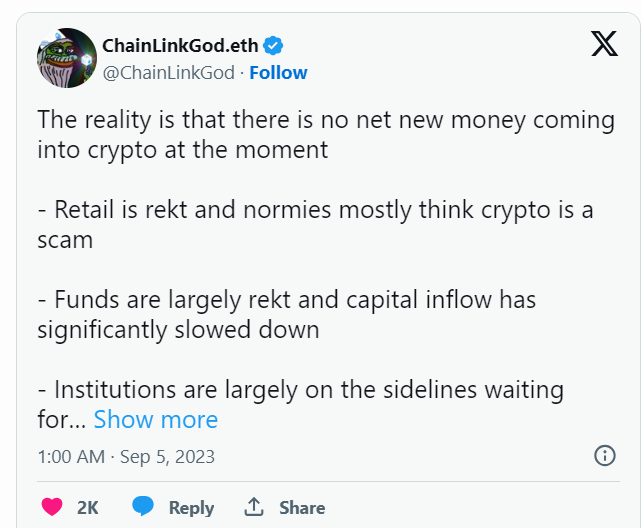Market markers in the digital asset sector are struggling with increasing costs as they take measures to mitigate risks.
Market making in digital tokens has historically been lucrative, but the recent market meltdown has led to a very different climate. Market makers are now increasingly concerned about their involvement in the industry, mainly due to increasing costs and the crash that saw $2 trillion wiped out of the market.
No New Money is Coming to Crypto
In a recent tweet, pseudonymous crypto investigator ChainLinkGod said:
“There is no net new money coming into crypto at the moment.” He claimed that capital inflow has significantly slowed as some major crypto funds have gone bankrupt and institutional investors wait for regulatory clarity.
“It’s pure PvP for traders (memecoins) and most projects are in survival mode, with those who didn’t build a good diversified treasury during the bull now struggling,” the user wrote.

According to a Tuesday report by Bloomberg, market makers have also changed their strategies to mitigate potential risks of future market upheavals. The report said that the shift has reduced the profit margins, further driving market makers away from the industry.
Liquidity providers like Auros, GSR Markets, and Wintermute Trading are diversifying their activities across multiple exchanges. They are also moving their digital asset inventories away from trading venues, using them as collateral to borrow tokens for deployment on crypto platforms.
These companies aim to safeguard their assets by keeping collateral at custodians or prime brokers and only exposing tokens obtained from lenders if an exchange fails. However, using intermediaries has resulted in a 20%-30% drop in profitability compared to directly depositing and leveraging coins with a trading site.
“The FTX debacle was a wake-up call for the industry,” Le Shi, head of trading at Auros, said. He acknowledged that the industry hadn’t always prioritized the risks of leaving assets on exchanges, but that mindset has changed.
Shi also emphasized that the impact on margins varies significantly among companies due to numerous factors. These include using dedicated off-exchange custody providers, which can limit leveraging and fees charged by depository service providers.
Market-making firms like Jane Street Group and Jump Crypto have reduced their involvement in digital assets, citing low trading volumes, waning volatility, and increased regulatory scrutiny of exchanges like Binance and Coinbase as reasons for the shift.
“Market makers are increasingly looking to reduce their exposure to centralized exchanges to reduce risks,” said Meng Hwee Neo, managing director of trading and Singapore co-head at GSR Markets.
Neo stated that GSR Markets, traditionally active in trading smaller coins, is now focusing more on the two leading tokens, Bitcoin and Ethereum, as part of a “flight to quality” strategy.
DeFi Projects See Increased Popularity as Interest in CeFi Drops
While most spot token trading occurs on centralized exchanges, decentralized peer-to-peer platforms such as Uniswap have gained popularity. These platforms enable trading through algorithmic, blockchain-based software known as smart contracts, with users retaining custody of their tokens.
A March report from CoinGecko revealed that digital asset investment firms invested $2.7 billion in DeFi projects in 2022, marking a 190% increase compared to 2021. In contrast, investments in CeFi projects decreased by 73% to $4.3 billion during the same period. Similarly, trading volumes for crypto derivatives have halved to $1.5 trillion over the same period. This retreat of liquidity providers is evident in the dwindling market depth, which refers to the market’s ability to accommodate large orders without significantly impacting asset prices.
The digital asset market has partially recovered from last year’s sharp selloff, but they still remain well below their all-time highs. For instance, Bitcoin has seen a 55% increase since the beginning of the year, reaching $25,700, but it is still more than $40,000 below its 2021 record. Crypto companies hope the market could improve if pending applications for the first spot Bitcoin exchange-traded funds (ETFs) in the US are approved. The recent Grayscale win against the SEC has further increased optimism toward launching a spot BTC ETF in the US.
In a Friday note, JPMorgan analysts said the Grayscale win will likely force the SEC to approve multiple spot Bitcoin ETFs. They argued that the win implies that the SEC would have to retroactively withdraw its previous approval of futures-based Bitcoin ETFs to defend its denial of Grayscale’s proposal of converting its Bitcoin trust into an ETF.
However, such a move would be “very disruptive and embarrassing for the SEC” and appears unlikely, the analysts said. “It looks more likely that the SEC would be forced to approve the spot bitcoin ETF applications that are still pending from several asset managers, including that from Grayscale.”
Neither the author, Ruholamin Haqshanas, nor this website, The Tokenist, provide financial advice. Please consult our website policy prior to making financial decisions.
***
This article was originally published on The Tokenist. Check out The Tokenist’s free newsletter, Five Minute Finance, for weekly analysis of the biggest trends in finance and technology.
